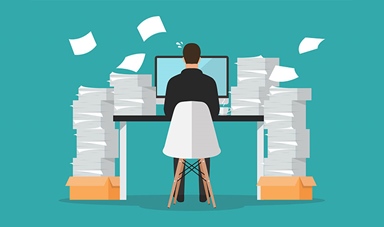Loading component...
At a glance
For many accountants, this year’s tax season will be busier than usual, with many people lodging earlier than usual and claiming additional expenses related to working from home, JobKeeper payments and redundancies.
Many businesses have also been devastated by the bushfire season and are relying on accountants to guide them through their tax obligations.
Job losses, a drop in income and uncertainty as to when the economy will recover have all led to some difficult conversations and distress. It is likely that many people will be hoping their tax return provides a much-needed cash injection, but for some that may not be the case.
How can accountants prepare to help both their staff and clients navigate what lies ahead?
Keith Clissold FCPA, of HG Mayer & Co in Western Sydney, says a combination of the fire season and COVID-19 means many practices have been working 30-40 per cent harder than during the same period in 2019.
“[This year] has been unprecedented in terms of the amount of work we have faced that we weren’t expecting, and there are going to be a lot of practices under even more pressure because the clients are going to come in early and want their tax return completed.
“At the same time, we're dealing with the June BAS, the June JobKeeper payments, and probably helping clients close off their single touch payroll for the year, and reconciling income statements,” Clissold says.
There are some simple steps to help stay on top of the busy period ahead, Clissold says.
Be prepared for complicated claims this tax season
Clissold says he’s expecting claims may be more complicated because of the double impacts of COVID-19 and the devastating bushfire season. He says it is important to communicate clearly with clients from the beginning.
“Sending clients a simple checklist to help them prepare all documentation for their tax return can help make the process smoother,” says Clissold.
“People will want to lodge early but they need to make sure they have all the information they need from their bank, for example.
“We send out a checklist to help people get their claims organised, as well as provide information on JobSeeker and redundancy payments and the tax implications for those.”
Working from home expenses are a new claim for many people and the Australian Taxation Office made an early call to change the way they will be calculated, announcing employees could claim a flat rate of A80 cents per hour for heat, light and power between March 1 and June 30 2020.
Phil McCann FCPA, of McCann Financial Services in North Melbourne, says the lockdown period is a good time for people to assemble all expenses and income sources to avoid delays to processing their tax return.
“We advise clients to list everything they can. Every single office expense, every pen, pencil, computer, notepad and book,” McCann says.
Smaller tax returns may be in the offing
Helping clients who have received JobKeeper payments is also a new focus for accountants this year and advising people they need to pay tax on them may be news to some.
“Some people may actually have a small tax bill to pay because no tax has been taken out of those JobKeeper payments. That will be an issue that they may not have thought about and could result in a smaller return than they are expecting,” says Clissold.
McCann says now is also a good time to support your staff in helping them have the right conversations with people who are hoping their tax return will bring some financial relief. The fact is there will be some big refunds and some disappointments.
“We’ve already had some very difficult conversations with people who’ve lost their income in the past months, helping them get JobKeeper, etc. For people who are expecting a healthy return this year and might be disappointed when that is not the case, there will no doubt be more of those conversations to have.
“This has an impact on your staff as well as your clients and it is worth being prepared to explain to people why they may be looking at a much smaller return,” says McCann.
“If they got a A$4000 refund last year and this year they're only getting A$1000, they'll want to know why straight away. Make sure you can communicate the reasons clearly and upfront.”Clissold says it is also likely there will be an increase in charges for tax returns because of the complexity involved and the issues that may have been raised because of COVID-19.
“I expect firms to put their charges up by at least 20 per cent this year, especially if there is additional work to be done in calculating home office expenses. Advising your clients in advance is recommended, as is making it clear where the extra charges are coming from,” he says.
Information on the changes to home office expenses is available on the ATO website.

